Help! My Dog Just Bit the Neighbor!
So, you have what you have always thought was the perfect dog and the perfect neighbor, until suddenly the dog takes a bite out of the neighbor. What do you do next? Of course, you will be expected to pay the medical bills but how do you prevent it from happening again, and how do you protect yourself legally?
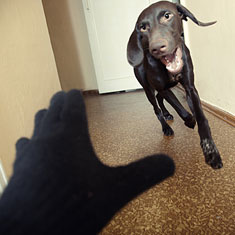
Preventing Dog Bites
Many times, preventing future dog bites depends upon figuring out what happened to cause the first dog bite. If your dog bit someone for a specific reason, you will of course need to prevent the same situation from occurring again. For example, if your neighbor's child poked your dog with a stick through the fence repeatedly just prior to being bitten, you'll need to find a way to keep the child from doing this again. Tact is the key here. There is a very fine line between coaching the child to leave the dog alone and blaming the child for the bite your dog inflicted.
Some of the common reasons why dogs bite include being interrupted while they are eating, sleeping, or tending to puppies; being un-neutered; and feeling that their human family is in danger. If your dog is food-protective, the ideal time to find this out is before someone is bitten. To test your dog's level of food protectiveness, set down the dog's food dish in front of him as usual, then while the dog eats, use a stick to try to move the dish out of the dog's reach. If the dog simply follows the dish and quits eating, chances are, he won't get too upset at having a meal interrupted.
If, on the other hand, the dog growls or attacks the stick, the dog should be identified as food protective. From the moment you know this about your dog, you have a duty to take special precautions during meal times. Make sure you feed your dog when there is no one else around who might be injured, particularly children.
While your dog is expecting, prepare your children (and any neighbor children who spend a lot of time at your house) for the fact that new mamas are always protective of their babies. Tell the kids that you will make sure they all get time to play with the puppies, but that they must wait until you are there to supervise. You may want to limit interaction between kids and puppies to times when the mama dog is outdoors.
If your male dog is un-neutered, neuter him. Testosterone can contribute to the dog's aggressive tendencies, and neutering is often a good way to reduce the chances that your dog will bite someone.
Although having your dog protect you and your family is desirable most of the time, it can become problematic if the dog is indiscriminate in identifying risks. If your dog thinks that everyone who enters your property is there to harm you, you'll need to find a way to protect those who visit you with non-nefarious plans. You can try de-sensitizing your dog to visitors by having a wide variety of people ring your doorbell, and rewarding your dog each time he doesn't get overly agitated. While you do this, however, be sure your dog is physically separated from the visitors to prevent inadvertent bites.
For example, you might lock your dog in a kennel near the door, where he can see people approaching. Have someone walk to the door, ring the doorbell, and walk into the home. Repeat this several times until someone can complete the sequence of events without your dog trying to lunge out of the kennel. Reward the dog for staying calm. Then, place your dog behind a baby gate where he can still see the door. Go through the exercise again and reward the dog only when he remains calm when someone comes to visit. Next, try it with the dog on a leash, closer to the door. Go through the exercise again with just your hand on the dog's collar, and then finally with no restraints on the dog.
Until your dog gets the hang of remaining calm when people come into the house, make sure you keep your dog's mouth physically separated from your guests. Whether you put the dog behind a baby gate or use a muzzle, you must keep your dog from biting, especially when you know there is a problem.
Legal responsibility
From a legal standpoint, if your dog has bitten even one person, regardless of the circumstances, the case could be made that you knew or should have known that the dog would bite. This can open you up to a whole realm of lawsuits, both criminal and civil. Although it is true that every dog with teeth is capable of biting, your dog's past history will be used as proof that you should have had a heightened awareness of the possibility and should have taken extra precautions.
Spend a little time getting to know the dog-related laws in your state and local jurisdictions. Find out how "vicious" or "dangerous" dogs are defined in the law. Some places define these terms depending on breed, while others classify dogs based on past history, and still others leave the definition intentionally vague. In some cases, a hybrid definition is used, citing both breed and history. For example, in the state of Ohio, a vicious dog is defined as a "dog that, without provocation…has killed or caused serious injury to any person…or has killed another dog or belongs to a breed that is commonly known as a pit bull dog."
Once you know the definition, take a few minutes to honestly analyze your dog's behavior if the law in your area specifies past behavior in the definition. If your dog falls into the dangerous or vicious category, you will need to protect yourself from lawsuits by carrying the proper insurance. Typical homeowner's insurance provides coverage for most dogs, but often not for dangerous or vicious dogs. You may need a special rider or addition to your policy to cover your dog if he fits your state's definition of vicious or dangerous.
These policies are very expensive, so it pays to do your homework, meaning you must read the fine print on any policy you plan to sign. Some policies will only cover a dog that is contained on your property, so if you have a dog who routinely runs loose, the policy will do you no good.
Once you have a policy in place that is appropriate to your situation, and assuming you keep your premiums paid, your insurance company will defend you if your dog bites someone and that person sues you. If you receive notice of a lawsuit, be sure to let your agent know right away, and the insurance company's lawyers will defend the case with minimal involvement from you.
Doggies Den: Latest Articles
 Homemade Thanksgiving Treats for Your Dog
Homemade Thanksgiving Treats for Your Dog
NUTRITION We all want to include our dogs in our holiday celebrations, but hopefully, you're aware that sharing table scraps with your dog isn't always the best idea.
 Keeping Your Dog Safe during the Summer Months
Keeping Your Dog Safe during the Summer Months
HEALTH Summer is coming on fast, so it’s time to plan how you will keep your dog safe and healthy through the lazy, carefree, warm days.
 Vaccination Time Again-Keeping Your Puppy Healthy
Vaccination Time Again-Keeping Your Puppy Healthy
DOG HEALTH So you have your new puppy picked out. There are quite a few shots, treatments and examinations that will keep the newest member of your family healthy.
 Canine Thanksgiving Feast
Canine Thanksgiving Feast
NUTRITION With the wide variety of food at Thanksgiving dinner, chances are you'll want to give your dog something special, too. If you're contemplating what to feed your dog for the holiday, here is a guide to a great Canine Thanksgiving Feast.
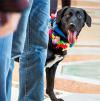 Dog Walking Tips Every Owner Should Know
Dog Walking Tips Every Owner Should Know
DOG FUN Walking your dog is not only crucial to keeping him healthy and happy, it strengthens the bond between your canine friend and his caregiver. There are a lot of obstacles out there. Don’t forget these simple tips to keep your walk fun and safe in the outside world.
 The Benefits of Physiotherapy for your Dog
The Benefits of Physiotherapy for your Dog
HEALTH The same techniques that physiotherapists use to treat a variety of injuries and conditions in humans have been adapted to suit animals with great success. Family pets, show dogs, and working dogs can all benefit greatly from physiotherapy. Dogs whose activities involve a lot of agility are especially susceptible to the types of problems that physiotherapy can address.
 The Decision- Adding a Dog to Your Family
The Decision- Adding a Dog to Your Family
FIRST TIME OWNERSBringing a dog into your family is a decision where many people don’t realize it’s magnitude until after they have the dog. There are a number of things that you need to research before you decide to purchase a dog, and it starts right in your own home.
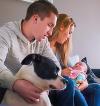 Bringing Your Dog Into Your New Baby's Life
Bringing Your Dog Into Your New Baby's Life
HEALTH Many believe that a dog and a new baby cannot happily coexist, so therefore the dog has to go. This is not necessarily the case.  A new baby does not mean you have to abandon your dog.

Doggies Den:
Most Popular Articles
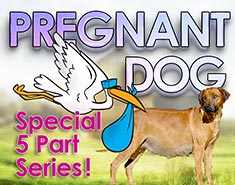
Dog Pregnancy Symptoms
HEALTHIf you suspect your dog might be pregnant, check out part one in this series on pregnant dogs, where we cover pregnant dog symptoms.
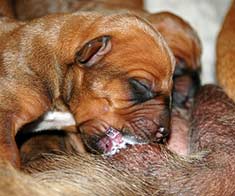
Dog Birth
HEALTHIn the third article of our dog pregnancy series, we look at the wonderful, but messy, process of bringing newborn puppies into the world.
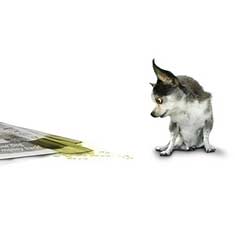
Indoor Dog Potties
DOG PRODUCTSIt's been a long day at work. You were so busy, you didn't even take time to eat a sandwich, let alone run home to let your dog out. You're on your way home, knowing the poor dog is crossing his or her legs by now, when your car breaks down, delaying you even further. Can't somebody make this easier?
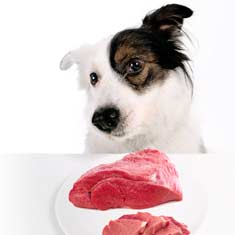
Your Dog’s Digestive System
PHYSIOLOGYEver wonder why your dog eats so fast? Or why he eats gross things? Or why he gets sick to his stomach? Or why his waste stinks so bad? Some of these things are normal, some are not.

Canine Respiratory System
BREATHINGThe basic function of your dog's respiratory system is to bring oxygen in to and remove carbon dioxide from the body. Knowing the symptoms of respiratory diseases can help you help your stay healthy.
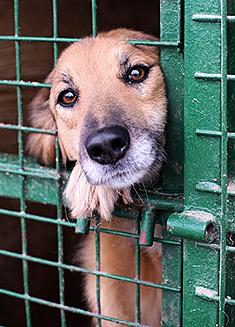
Shelter Dog Adoption Tips for Success
ADOPTION Are you intimidated by the prospect of "rescuing" a dog from a shelter? One reason that you may be wary of adopting a dog from a shelter is not knowing how to choose. Adopting a dog from a shelter can be a rewarding process, if you're prepared to do a reasonable amount of research.
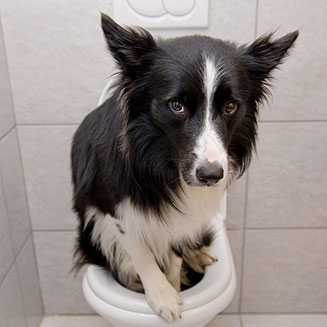
Canine Urinary Tract Infections
SYMPTOMS AND TREATMENTDoes your dog seem to be having trouble relieving his or her bladder? Learn how to recognize the signs of urinary tract infections and how to treat them before they spread.
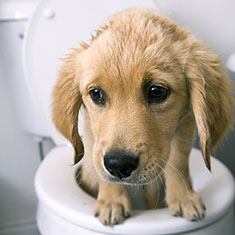
What to do for Dog Diarrhea
SYMPTOMS AND REMEDIESIf you have dogs in your house for any length of time, you have likely experienced at least one bout of dog diarrhea. Beyond the pain in the tuckus involved in cleaning up the mess, you should know what causes diarrhea, and when it's important to see the vet.

What to do for a Dog Bite
DOG BEHAVIOR Getting bitten by a dog can be scary, and you may be tempted to run around in circles for a while, trying to figure out what to do. Here's our guide to help you manage the situation.
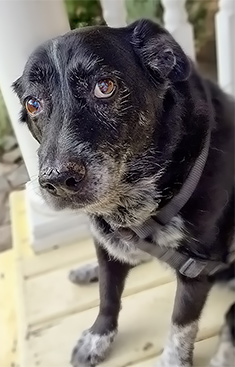
Top Ten Tips for Living with a Senior Dog
DOG HEALTH Bringing home a new puppy is so exciting, but it doesn’t take all that long for your exuberant puppy to grow into a senior dog who may have special needs. Here are the doggies.com top ten tips for taking care of your companion who has been with you through so much.
